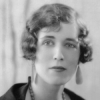Georgette Heyer

Georgette Heyer
Georgette Heyer /ˈheɪ.ər/was an English historical romance and detective fiction novelist. Her writing career began in 1921, when she turned a story for her younger brother into the novel The Black Moth. In 1925 Heyer married George Ronald Rougier, a mining engineer. The couple spent several years living in Tanganyika Territory and Macedonia before returning to England in 1929. After her novel These Old Shades became popular despite its release during the General Strike, Heyer determined that publicity was not...
NationalityBritish
ProfessionNovelist
Date of Birth16 August 1902